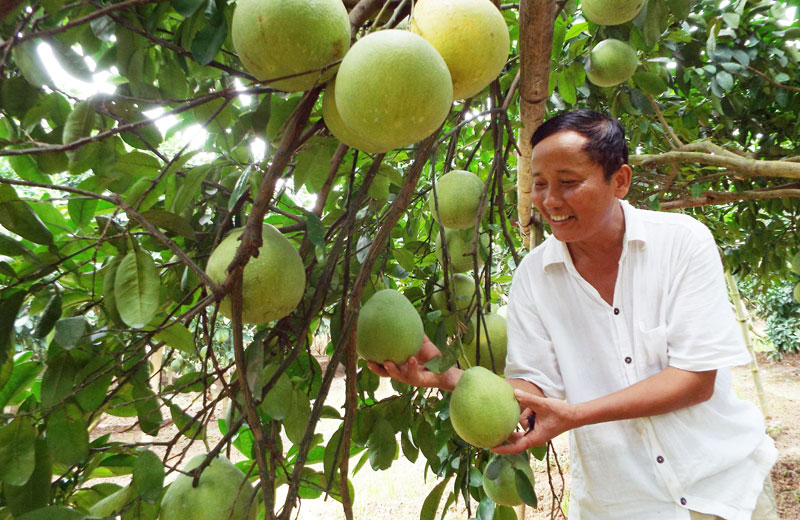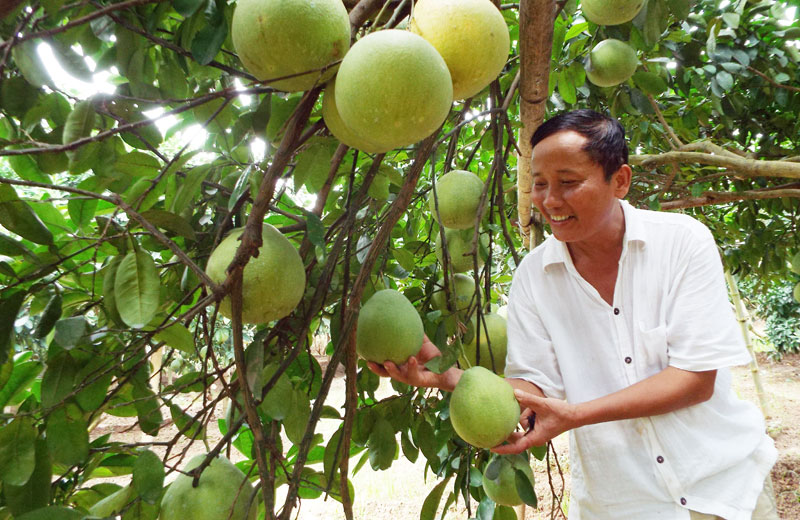
(HBO) - The collective trademark recognition of Tan Lac red grapefruit received in late November 2017 has affirmed the quality of a specialty in Muong Bi and efforts of Tan Lac district’s authorities and farmers.
The district will continue to improve the branding
of the fruit by expanding cultivation areas under VietGAP standards to
contribute to the province’s clean food supply. This year, the People’s
Committee of Tan Lac district registered the fruit in the country’s One
Commune, One Product programme.
 Dong Lai commune (Tan Lac district) expands grapefruit
growing areas to generate higher income for locals.
Dong Lai commune (Tan Lac district) expands grapefruit
growing areas to generate higher income for locals.
Statistics show that Tan Lac district is
currently home to more than 1,000 ha of grapefruit, with 395 ha of which being
ready for harvest.
The growing areas stretch in communes along
National Roads No.12B and No.6, notably Dong Lai, Thanh Hoi, Tu Ne, Ngoc My, Quy
Hau, Man Duc and Phong Phu. Red grapefruit trees can generate an average income
of more than 700 million VND per ha, and even over 1 billion VND per ha in some
cases.
A cooperative specialising in growing,
processing and marketing Tan Lac red grapefruit in Muong Khen township owns 30
ha of a variety of red grapefruit named Giang Loc, yielding 500,000 fruits a
year. As the fruits are grown under VietGAP standards, only allowed substances
are used.
Tan Lac red grapefruits are mostly round,
some of them look like pears, weighing about 0.8- 1 kg each. Their peel turns
yellow when ripen, with red juicy flesh and sweet taste. Especially, the fruit
has a nice fragrance which distinguishes itself from that of other varieties
like Dien, green and nam roi. Harvest time falls from the 10th to 12th month of
the lunar year.
Head of the Agriculture and Rural
Development office of Tan Lac district Vu Quang Hung said the collective
trademark to its red grapefruit creates a chance for the district to continue
the cultivation and development of its branding, thereby creating a driving
force for agriculture restructure towards raising added values and sustainable
development, in line with the national target programme of building new-style
rural areas.
The district aims to expand the total grapefruit
cultivation areas to 1,200 ha by 2020, serving as a foundation for the
development of the fruit’s branding and building of Tan Lac red grapefruit
geographical indication./.
According to data from the Hoa Binh Provincial Party Committee, the industrial production index for the first six months of 2025 is estimated to have increased by 20% compared to the same period last year. This marks the highest year-on-year growth rate for this period since 2020.
In the first six months of 2025, Hoa Binh province’s export turnover was estimated at 1.145 billion USD, marking an 18.11% increase compared to the same period in 2024. Import turnover was estimated at $ 804 million, a 17.15% increase, which helped the province maintain a positive trade balance.
The lives of the ethnic minority farmers in Tan Lac district have gradually improved thanks to the new directions in agricultural production. This is a testament to the collective strength fostered through the professional associations and groups implemented by various levels of the district’s Farmers’ Union.
With the motto the "product quality comes first,” after nearly one year of establishment and operation, Muong village’s Clean Food Agricultural and Commercial Cooperative, located in Cau Hamlet, Hung Son Commune (Kim Boi district), has launched reputable, high-quality agricultural products to the market that are well-received by consumers. The products such as Muong village’s pork sausage, salt-cured chicken, and salt-cured pork hocks have gradually carved out a place in the market and they are on the path to obtaining the OCOP certification.
In the past, the phrase "bumper harvest, rock-bottom prices" was a familiar refrain for Vietnamese farmers engaged in fragmented, small-scale agriculture. But today, a new spirit is emerging across rural areas of Hoa Binh province - one of collaboration, organisation, and collective economic models that provide a stable foundation for production.
Maintaining growing area codes and packing facility codes in accordance with regulations is a mandatory requirement for agricultural products to be eligible for export. Recently, the Department of Agriculture and Environment of Hoa Binh province has intensified technical supervision of designated farming areas and packing facilities to safeguard the "green passport" that enables its products to access international markets.



 Dong Lai commune (Tan Lac district) expands grapefruit
growing areas to generate higher income for locals.
Dong Lai commune (Tan Lac district) expands grapefruit
growing areas to generate higher income for locals.